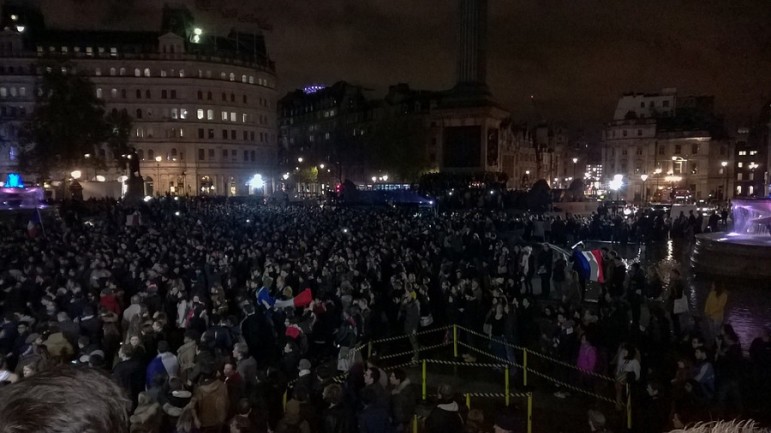
In the midst of a crisis, shouldn’t political discourse stick to the facts—or at least try to veer close to a neighborhood where facts may reside? This is especially important when politicians attempt to conflate the terrorism of ISIS gunmen with the humanitarian response to refugees from Syria’s never-ending civil war.
The horrors of Paris and Beirut cannot be explained away. The ISIS terrorism constitutes crimes against humanity and should be treated as such, perhaps with indictments at the International Criminal Court. But the disgust of Americans and others in secular societies cannot be allowed to transform itself into hatred that further victimizes a population that has already been deeply victimized by war and mayhem.
Fear in the wake of the terrorism in Paris this past weekend is understandable, but the nonprofits dedicated to helping Syrian refugees must stand up for truth against the hysteria whipped up by politicians playing fast and loose with facts—or actually using no facts at all.
Paranoid fears
Donald Trump has raised the specter that President Obama wants to bring in 200,000 Syrian refugees. Where and how he concocted that figure is unknown. Perhaps he has conflated Secretary of State John Kerry’s statement that the U.S. might admit as many as 185,000 refugees, but that includes people from around the world—only as many as 10,000 Syrian refugees would be admitted to the U.S. after vetting. Trump’s statement earned him “four Pinocchios” from the Washington Post’s Fact Checker column and dismissals from the Annenberg Public Policy Center’s Factcheck.org and the Tampa Bay Times’ PolitiFact.
Nothing about facts seems to stop Trump or others like him. Right-wing commentator Sean Hannity has picked up the figure of 250,000 Syrian refugees—from a source that appears to be a parody or hoax site. Trump began using the 250,000 Syrian refugees figure right after the Paris terrorism—but that doesn’t stop that figure from being any more correct than the prospect of 200,000 refugees coming to the U.S..
What motivates political leaders to use outrageous figures like these? The most obvious reason is to instill fear. The hysterical opposition of critics of Syrian refugees—for example, the reactions of South Carolina counties preemptively trying to head off anyone coming to their communities—grows wild in the fertile ground of misinformation. The latest example? Before the Paris attacks, the twittersphere erupted with word that 10,000 Syrian refugees had suddenly, surreptitiously been admitted to the New Orleans area, almost overnight. Circulating as well were pictures of masses of purported Syrian refugees in the Crescent City, later revealed to have been photos of refugees in Hungary.
That was enough for Louisiana governor (and presidential candidate) Bobby Jindal to write to President Obama complaining about the “first wave of Syrian refugees” that had come to New Orleans with “Louisiana…kept in the dark.” The purported “wave,” ascribed to Catholic Charities, has turned out to be a mere two families with an expectation of one more sometime soon.
Vetting refugees
The U.S. government cannot guarantee that there will be no potential terrorists among the refugees that might be admitted to this country. How could it? Think of the stories of arrests of murderers in the U.S., with the obligatory follow-up interviews where neighbors observe that the criminals in question were quiet, nice, polite, unassuming, friendly, and completely unexpected to be malefic toward their fellow man. The same is probably just as true for your neighbors next door or for the person who moves into the vacant apartment down the hall in your building.
But the United States isn’t taking a pass on vetting refugees, regardless of the hysteria sweeping the nation. Kyle Blaine in Buzzfeed describes the U.S. system as “one of the most robust security screening processes in the world for potential refugees.” The process includes the following elements:
- Multiple high-level security checks
- Biometric screening
- A mandatory interview with the Department of Homeland Security
- A medical screening
- A cultural orientation program (which consists of videos on housing, employment, education, and hygiene, among other topics)
Foolproof? Nothing is. But for the potentially 10,000 Syrian refugees that the U.S. is considering, the State Department estimates this as an 18-to-24-month timeframe. Compare this to the review process used in many European countries, relying on case files, for which the review can take as little as a few weeks.
Sign up for our free newsletters
Subscribe to NPQ's newsletters to have our top stories delivered directly to your inbox.
By signing up, you agree to our privacy policy and terms of use, and to receive messages from NPQ and our partners.
The 10,000 Syrian refugees that the U.S. might accept next year are a tiny proportion of the number displaced by the Syrian civil war. The United Nations High Commissioner for Refugees (UNHCR) estimates more than four million Syrians have been displaced to other countries and 7.6 million have been displaced within Syria. The BBC estimates that there have been some 750,000 refugees, Syrians and others, who have arrived by sea in Europe this past year. It isn’t like the U.S. is taking a disproportionate number of Syrians escaping the murderous forces of ISIS and the Assad regime.
Muslim victims
Whether one considers ISIS a medieval army that misuses and perverts Islam or a murderous band that isn’t even really Muslim at all, there is no question that the most frequent victims of ISIS in Syria, Iraq, and other countries are Muslims. Just days before the horrors of the attack on Paris, there was a massive incident in a southern Beirut neighborhood. ISIS suicide bombers killed 43 people and wounded hundreds. The Beirut neighborhood that was hit looked a little like the café areas of the third, 10th, and 11th Arrondissements in Paris, except that it didn’t get much attention from the press—perhaps because the neighborhood was a Shiite area associated with Hezbollah. Muslim deaths matter like any others, even when the murderers are also Muslims.
Of course, even before the Islamic State claimed responsibility for the Paris attacks, leading American politicians were ratcheting up their Islamophobia. Following the terrorism in Paris, presidential candidate Ben Carson called for an immediate cessation of Muslim immigration to the United States. In the wake of Paris, Jeb Bush one-upped the Baltimore neurosurgeon by calling for only Christian Syrians to be granted refugee status in the U.S.
It is hard to overstate the message that sends to the estimated 2.77 million Americans who identified as Muslim in 2010. In a way, that plays into the hands of the terrorists. The headline in a post-Paris edition of Quartz was succinct and on point: “The only thing we have to fear isn’t fear, it’s hatred.” Hatred is what the terrorists who unleashed the horror in Paris this past weekend want—a society of favored believers and reviled apostates. In theory, secular Western society doesn’t operate that way. In theory, we pride ourselves on openness to, acceptance of, and even celebration of difference and diversity. It would seem to go against the fundamental values of a liberal democratic society to stigmatize millions of Americans who may be of Pakistani, Bangladeshi, Egyptian, and, yes, Syrian extraction because of terrorists in Paris or Beirut carrying out their murders claiming to be motivated by some version of Islam.
Why are Syrians risking their lives on boats to cross the Mediterranean to escape the madness of their homeland now, when the civil war in Syria has been raging since 2011? The Guardian reports that when refugees leave their homes, they typically leave with the expectation that they’ll be able to return when hostilities end. After four long years, many Syrians in camps in Turkey, Jordan, and Lebanon have simply given up hope. As temporary refugees in the camps, the Syrians are often living in horrendous physical conditions without heat, water, or sanitation, not allowed to work, suffering with inadequate international refugee aid, and, perhaps most significantly in some ways, watching their children miss years of education. These people aren’t choosing to apply for asylum in Europe or the U.S. because they want to start again at the bottom of society, but because they have fled violence and death and see fading prospects of being able to return to revive their normal lives.
The conditions faced by refugees are horrendous, but so is living and dying in Syria where nearly a quarter-million people have been killed and one million wounded or left permanently disabled. The Mercy Corps has called the Syrian refugee situation “the worst humanitarian disaster of our time.” It would be an appalling statement for America to take a pass on responding to the needs of some of these displaced Syrians.
Scoring political points
Like presidential candidates Trump, Carson, and Bush, there is no political downside for American political leaders to come out against resettling Syrian refugees in the U.S. Even before the Paris incident, there were counties in South Carolina and elsewhere in the country passing resolutions expressing their opposition to the resettlement of Syrian refugees in their environs. Since Paris, the anti-refugee sentiment is flourishing.
In Erie County, New York, for example, Conservative Party legislator Joseph Lorigo called on County Executive Mark Poloncarz to reject Syrian refugees in light of the Paris terrorist incident. “The risk to our community is far too great,” Lorigo tweeted. “We must do everything we can to protect the citizens of Erie County.” In Columbus, Georgia, Republican State Senator Josh McKoon called for an immediate suspension of refugee resettlement, though the total number of Syrians who have settled in the Atlanta metropolitan area since 2011 is only 59.
Now governors are getting into the political melee. In Alabama, Governor Robert Bentley has announced that no Syrian refugees will ever come to Alabama “on his watch,” though Alabama has never accepted any Syrian refugees through the federal refugee assistance program in the first place. Bentley was joined by Michigan Governor Rick Snyder, who said that the state was halting acceptance of Syrian refugees “for the safety of our residents.” Snyder’s position is an odd one for a governor who has promoted immigration as a possible response to the depopulation of Detroit and whose state includes the cities of Hamtramck, where the city council has a Muslim majority, and Dearborn, where the population is about 30 percent Muslim. A suburb of Detroit, Dearborn has been an epicenter for threats of violence and intolerance, but directed at Muslims, ranging from Koran-burning Florida preacher Terry Jones, who was convinced via the right wing press that Dearborn had adopted Sharia law, to threats of violence to punish Dearborn residents in retaliation for the ISIS terrorism in Paris, prompting an immediate police investigation of the source of the threats.
J.D. McCray of the International Rescue Committee points out that the robust U.S. vetting system for refugees has been in existence for 35 years, “and in the history of the program, no one who has gone through it has ever been arrested for domestic terrorism.” That should point a direction for nonprofits in this country: to speak up for handful of Syrian refugees who might be admitted to this nation of 320 million inhabitants, to explain the facts of the refugee and asylum process to a population that has been fed a steady diet of misinformation and scare tactics, and to defend the values of secular democracy against the venality of ISIS terrorists wherever they may operate.












